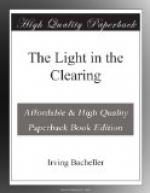“No, sir—no, siree! He was in hell—that’s where he was—reg’lar ol’ fashioned, down-east hell, burnin’ with fire an’ brimstun, that he’d had the agency for an’ had recommended to every sinner in the neighborhood. He was settin’ in his room. God o’ Isr’el! You orto ‘a’ seen the motions he made with his hands an’ the way he tried to speak when I went in there, but all I could hear was jest a long yell an’ a kind of a rattle in his throat. Heavens an’ airth! how desperit he tried to spit out the thing that was gnawin’ his vitals. Ag’in an’ ag’in he’d try to tell me. Lord God! how he did work!
“All to once it come acrost me what he wanted—quick as ye could say scat. He wanted to have Kate’s headstun took down an’ put away—that’s what he wanted. That stun was kind o’ layin’ on his stummick an’ painin’ of him day an’ night. He couldn’t stan’ it. He knew that he was goin’ to die purty soon an’ that Kate would come here an’ see it an’ that everybody would see her standin’ here by her own grave, an’ it worried him. It was kind o’ like a fire in his belly.
“I guess, too, he couldn’t bear the idee o’ layin’ down fer his las’ sleep beside that hell hole he’d dug fer Kate—no, sir!
“Wal, ye know, mister, I jes’ shook my head an’ never let on that I knew what he meant an’ let him wiggle an’ twist like a worm on a hot griddle, an’ beller like a cut bull ’til he fell back in a swoon.
“Damn him! it don’t give him no rest. He tries to tell everybody he sees—that’s what they say. He bellers day an’ night an’ if you go down there he’ll beller to you an’ you’ll know what it’s about, but the others don’t.
“You an’ me are the only ones that knows the secret, I guess. Some day, ‘fore he dies, I’m goin’ to take up that headstun an’ hide it, but he’ll never know it’s done—no, sir—not ’til he gits to the judgment seat, anyway.”
The old man stopped and rubbed his hands together as if he were washing them of the whole matter. The dusk of evening had fallen and crocked the white marble and blurred the lettered legends around us. The mossy stones now reminded me only of the innumerable host of the dead. Softly the notes of a song sparrow scattered down into the silence that followed the strange story.
The old man rose and straightened himself and blew out his breath and brushed his hands upon his trousers by way of stepping down into this world again out of the close and dusty loft of his memory. But I called him back.
“What has become of Enoch?” I asked.
“Wal, sir, Enoch started off west ‘bout three year ago an’ we ain’t heard a word from him since that day—nary a word, mister. I suppose we will some time. He grew into a good man, but there was a kind of a queer streak in the blood, as ye might say, on both sides kind o’. We’ve wrote letters out to Wisconsin, where he was p’intin’ for, an’ to places on the way, but we can’t git no news ’bout him. Mebbe he was killed by the Injuns.”




